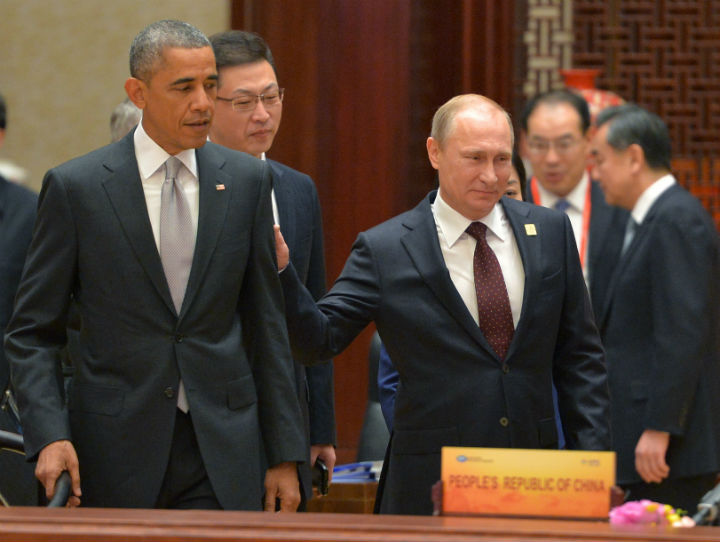Russia and the U.S. haven’t exactly been the best of pals, but their relationship has been particularly rocky through much of 2014. Based on how things have been going lately, Russian President Vladimir Putin seems to be signalling he has no interest in mending fences.

The tension over Russia’s annexation of Crimea in March and its military support for separatists in Ukraine‘s war-torn East have led to a spate of sanctions from the U.S. — as well as from Canada and the European Union — which Putin scoffed at and retaliated with sanctions of his own.
READ MORE: ‘Get out of Ukraine’: Harper to Putin at G20 Summit in Brisbane
Russia seemed to back off for a time, after a tenuous ceasefire went into effect. But, Putin appears to have revved things up in the lead up to the G20 Summit in Brisbane, Australia.
Australian Prime Minister Tony Abbott on Thursday assuaged concerns about a flotilla of Russian frigates sailing in international waters off the northeastern coast, which the Russian embassy said was a routine affair.
- Alberta to overhaul municipal rules to include sweeping new powers, municipal political parties
- Norad looking to NATO to help detect threats over the Arctic, chief says
- Grocery code: How Ottawa has tried to get Loblaw, Walmart on board
- Military judges don’t have divided loyalties, Canada’s top court rules
READ MORE: Australia angry over Russian warships off country’s coast
Ahead of that, less than two weeks before the deadline for Iran to reach a deal over its nuclear program, Russia came out with an offer to build atomic reactors for the Islamic Republic.
Through all that, NATO said Russia has sent tanks and artillery into eastern Ukraine, raising concerns the conflict in breakaway regions will flare up again.
“Putin likes to open talks by putting a knife on the table first,” The Economist quoted political analyst Kirill Rogov as saying.
And, Putin certainly knows when exactly to jab his blade right into the table.
The U.S. has been engaged in airstrikes against ISIS targets in Iraq since Aug. 8, and in Syria since Sept. 23. Obama this week committed to sending up to 1,500 more U.S. troops to Iraq, essentially doubling what has already been promised, to train Iraqi and Kurdish fighters.
Amid being engaged in aerial combat, Obama’s also dealing with a slew of domestic drama — from the Democrats losing control of the Senate in this month’s midterm elections to facing controversial decisions on immigration and the Keystone XL pipeline.
READ MORE: Canada three times softer on oil when it comes to Russia sanctions
Melik Kaylan, a contributor to Forbes, suggested Russia has “exploited” the U.S. being distracted by the crisis in the Middle East to reignite the crisis in Ukraine.
“Moscow expanded its power during… the ten years we in the West slogged about mired in Islamic wars. Surely Putin didn’t orchestrate that interlude, you might say. Perhaps not but he took full advantage,” Kaylan wrote in a post published Nov. 12.
Pierre Jolicoeur, an assistant professor of political science at the Royal Military College of Canada, agreed Putin is calculating the timing of his actions and that these latest moves have been a long time coming.
READ MORE: Renewed tensions after Russia backs Ukrainian separatists’ election
Following the end of the Cold War, Russia struggled to be recognized as a major influence in geopolitics, while NATO expanded into former Soviet states.
For better or worse, Putin has changed that.
Last year, Russia brokered a deal with the Syrian government to allow the Organization for the Prohibition of Chemical Weapons to document and destroy the country’s stockpile of chemical weapons, having previously been at odds with fellow permanent members of the U.N. Security Council and vetoing several attempts at international action in the Syrian civil war.
READ MORE: Obama and Putin circle each other warily in China amid Ukraine strains
Russia’s goal of “having a bigger voice in the international arena” has also failed, as evidenced by Russia being booted from the G8 following the annexation of Crimea and further interference in Ukraine’s East.
There’s not a lot of appetite for the U.S. and other Western countries to engage in a conflict with Russia over its influence and presence in Ukraine and that’s emboldening Putin, Jolicoeur explained.
The Western sanctions, combined with falling oil prices, have had a drastic effect on the Russian economy. Reuters reported Monday the Russian ruble has fallen almost 30 per cent against the U.S, dollar since the start of the year. And, Russia’s central bank predicts the Russian economy will see zero growth next year, according to the Guardian.
Despite annexing Crimea, Jolicoeur said Putin’s goal of keeping Ukraine under his influence has clearly failed — it’s more closely tied to the West than it was before.
“What is on the line is Putin’s weakness,” Joliecoeur said. The same can be said for Obama, whose party not only took a hit in the midterms but who has seen his approval rating remain low going into the second half of his final term as president.
READ MORE: Obama touts ‘unwavering’ U.S. commitment to NATO self-defence
He expects that as the cost of living in Russia continues to rise, voices of dissent will grow louder.
“The population seems to support their president because the nationalist fever in Russia is pleased to see the Crimea result without too much blood,” Joliecoeur said. “But, there are more and more people concerned with the economy.”




Comments